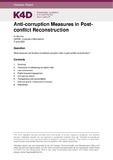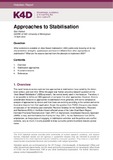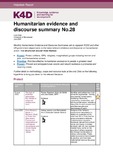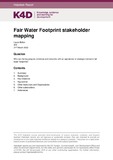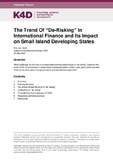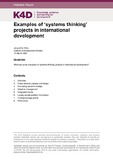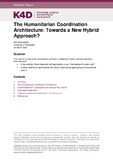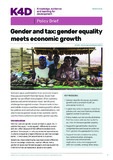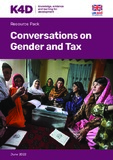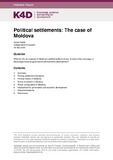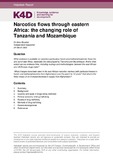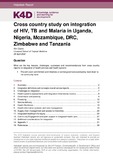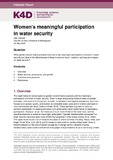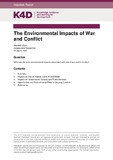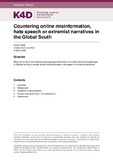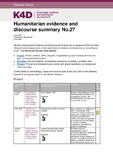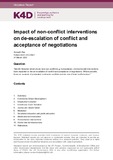K4D: Recent submissions
Now showing items 81-100 of 1138
-
Anti-corruption Measures in Post-conflict Reconstruction
(Institute of Development Studies, 2022-06-06)Corruption risks in post-conflict reconstruction are high, notably due to the typically large influx of international aid coupled with weak/illegitimate governments and low state capacity. Combatting corruption in post-conflict ... -
Approaches to Stabilisation
(Institute of Development Studies, 2022-04-22)This rapid literature review explores how approaches to stabilisation have varied by the donor, local context, and over time. While this paper was framed around a research question on the “Area Based Stabilisation” (ABS) ... -
Humanitarian Evidence and Discourse Summary No.28
(Institute of Development Studies, 2022-07)This is the 28th monthly Humanitarian Evidence Summary (HUMES) to signpost FCDO and other UK government departments to the latest relevant evidence and discourse on humanitarian action to inform and support their response. ... -
Fair Water Footprint Stakeholder Mapping
(Institute of Development Studies, 2022-03-31)This rapid review provides a stakeholder mapping of key players, initiatives, and networks with an operational or strategic interest in the Fair Water Footprint Declaration, based on a list provided by the commissioning ... -
The Trend Of “De-Risking” In International Finance and Its Impact on Small Island Developing States
(Institute of Development Studies, 2022-05-25)This rapid review synthesises the literature from academic sources, knowledge institutions, non-governmental organisations (NGOs), and trusted independent media outlets on the challenges small island development states ... -
Imposing Sanctions on Individuals
(Institute of Development Studies, 2022-03)There is consensus in the literature that individual and targeted sanctions have little power to coerce targets to make significant policy changes, and that they are less successful in achieving their overall goals than ... -
Examples of 'Systems Thinking' Projects in International Development
(Institute of Development Studies, 2022-03-15)A “systems thinking” (ST) approach generally recognises that international development processes are complex, inter-related, non-linear, and constantly changing. They involve many different types of actors, all with different ... -
The Humanitarian Coordination Architecture: Towards a New Hybrid Approach?
(Institute of Development Studies, 2022-03-29)Humanitarian coordination as an area of scholarly research has grown exponentially over the past decade and can be considered “a well-established and mature topic” now (Jahre and Jensen, 2021, 586).The global humanitarian ... -
Gender and Tax: Gender Equality Meets Economic Growth
(Institute of Development Studies, 2022-03)Women’s equal participation in an economy means they pay and benefit from fair taxes. Given that gender issues affect every aspect of tax systems, policies and administrations must identify and challenge bias against women. ... -
Conversations on Gender and Tax
(Institute of Development Studies, 2022-06)By being ‘gender aware’, tax policy, tax administration and tax research have the potential to both reduce discrimination and promote women’s economic empowerment, and benefit the wider inclusive economic growth ... -
Political Settlements: The Case of Moldova
(Institute of Development Studies, 2022-05-06)The new elite in post-1991 independent Moldova gradually captured state institutions, while internal drivers of reforms have generally been weak. Civil society has had limited effectiveness; and the media is largely dominated ... -
Narcotics Flows Through Eastern Africa: the Changing Role of Tanzania and Mozambique
(Institute of Development Studies, 2022-03-22)In the last few decades, the southern route’s use for drug trafficking gained prominence as increased law enforcement and unrest in the Middle East made the traditional ‘Balkan route’ less viable. This southern route ... -
Cross Country Study on Integration of HIV, TB and Malaria in Uganda, Nigeria, Mozambique, DRC, Zimbabwe and Tanzania
(Institute of Development Studies, 2022-04-22)This report is a synthesis of a specified set of reports from BACKUP and K4D with a focus on integration of health care services in relation to Malaria, TB and HIV and how integration efforts contribute or impede health ... -
Women’s Meaningful Participation in Water Security
(Institute of Development Studies, 2022-05-20)This rapid literature review explores gender transformative practices and the meaningful participation of women in water security. There is large and growing literature base on gender and water, with most of it coming from ... -
The Environmental Impacts of War and Conflict
(Institute of Development Studies, 2022-03-25)In modern warfare, the first widely acknowledged scientific study and documented case of environmental damage during conflict was the (direct and deliberate) use of Agent Orange and other toxic chemicals by US forces, from ... -
Use of Online Space in Pakistan Targeting Women, Religious Minorities, Activists and Voices of Dissent
(Institute of Development Studies, 2022-03-10)There is ample evidence that online hate speech in Pakistan is directed against women, religious minorities, journalists, voices of dissent and activists. The targeting of many of these groups is an expansion online of the ... -
Countering Online Misinformation, Hate Speech or Extremist Narratives in the Global South
(Institute of Development Studies, 2022-03-04)The widespread expansion of social media outlets has enabled the spread of mis/disinformation, hate speech and extremist narratives online. Internet-based technologies can also be used to confront these types of communication. ... -
Investors and Taxation: do Companies and Investors Avoid Paying Taxation After a Coup?
(Institute of Development Studies, 2022-03-14)This rapid literature review aims to gather evidence relating to whether investors and companies have actively sought to maintain operations in a country (primarily for profit and livelihood of employee reasons) while avoid ... -
Humanitarian Evidence and Discourse Summary No.27
(Institute of Development Studies, 2022-06)This is the 27th monthly Humanitarian Evidence Summary (HUMES) to signpost FCDO and other UK government departments to the latest relevant evidence and discourse on humanitarian action to inform and support their response. ... -
Impact of Non-conflict Interventions on De-escalation of Conflict and Acceptance of Negotiations
(Institute of Development Studies, 2022-03-31)There exists is a broad range of academic and grey literature that looks at non-conflict interventions and its impact on de-escalation of conflict and reduction of violence. There seems to be little in relation to the ...

